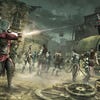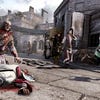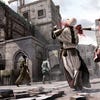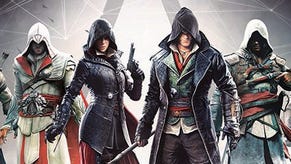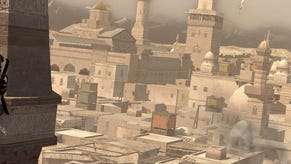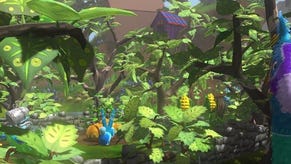Assassin's Creed: Brotherhood
Top of the Popes.
You can also recruit members of the populace and train them as assassins, sending them on missions around the world to sharpen their skills and calling on them in battle. Highlighting an enemy, pressing a button and watching a herald of angelic forms descend unseen from nearby rooftops to perform silent, brutal assassinations in your stead never grows old.
Midway through the game you meet an old friend who puts you on the trail of some nasty new Templar weaponry, and each of these quests takes in a self-contained stealth mission followed by an action sequence, isolating and enhancing other areas of the Ezio toolbox to similarly positive effect.
Clearly having learned from the city-building sections of the second game, Brotherhood also expands on the excellent Assassin's Tomb platform levels, sending you into the lairs of the followers of Romulus, some of which are masterful and change the pace of the game in the process. One in particular - a silent, practically greyscale exploration of a ruined basilica - would have Lara Croft weeping with nostalgia.
These diversions are always tied back into the core quest, which itself is very creative and supported by strong acting. One mission sees Ezio disrupting an assassination attempt in the ruins of the Roman Colosseum during a play about the death of Jesus Christ. It demands a developer of poise and compassion to wield such thorny concepts deftly, and it's a measure of Ubisoft Montreal's maturity that it is more than equal to the challenge.
Never before have we seen a game whose open world is so densely packed with things to do while maintaining such high quality. Whatever your particular taste, you simply cannot run from one area to another without encountering something else that you want to stop and do. Thanks to the Animus, which frees the developer to break the fourth wall at will, Brotherhood builds an intriguing mystery around compelling characters, surrounds them with collectibles and secrets, and encourages play - and nothing feels out of place.
The game's richness does mean that it suffers slightly from overexposure. Played at a reasonable pace, you can overlook the simplicity of the empire-building, along with the infrequent difficulty spikes that force you back to the last checkpoint. But in a game that seems designed to be greedily and intensively consumed, they are faults that matter.
Outside the campaign, Ubisoft's Annecy team has contributed a matching multiplayer component with four modes. In Wanted, Alliance and Advanced Wanted, you are given a picture of your target and a vague radar indication of where they are, while another player is given your image. It's kill or be killed. Just don't kill the wrong person.
Set within the Animus to justify the use of identikit NPC models, the result is that you're never sure who is stalking you, so you have to watch carefully to see who betrays themselves through their actions. In Advanced Wanted in particular - and also Manhunt, where players are split into teams of assassins and prey - identifying targets is satisfying, and skilful anonymity is richly rewarded.
There is a levelling system, and while it is impossible to gauge over just a few hours of pre-release play how well this aspect of Brotherhood will endure, multiplayer feels gripping and unusual, if not especially deep. It should extend the life of a game that already runs to 20 hours should you choose to rinse it thoroughly.
And choose to do so you almost certainly will, because Assassin's Creed: Brotherhood is a masterful combination of the many things that have striven to define the series in the past, each presented at its best and accentuated by considered design.
Should you need to retrace your steps to climb back up after a fall, for instance, you frequently discover a loot box stuffed with treats at the foot of the nearest convenient ladder. Ubisoft has tinkered with rewarding failure before, notably in the 2008 Prince of Persia reboot - but as with much of the rest of the game, Brotherhood presents a simple, elegant solution almost effortlessly.
It's one of many finishing touches to a game that started life as what sounded suspiciously like a fund-raising stopgap conceived on the back of an overdrawn chequebook and blurted out during a conference call. Assassin's Creed: Brotherhood is anything but that, however - it's one of the best games of 2010.


